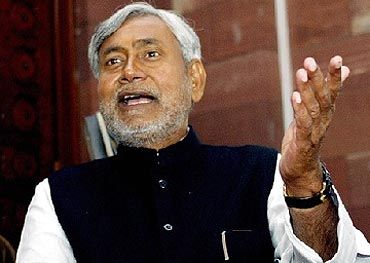 Ideology and principle are always put to work to camouflage political ambition. Nitish Kumar is a past master at this. His acceptance of the NDA in the first place was aimed at the top spot of Bihar. Then Delhi became the goal, but Narendra Modi’s rise as head of the campaign rang alarm bells. So Nitish suddenly remembered secularism, says Jaya Jaitly.
Ideology and principle are always put to work to camouflage political ambition. Nitish Kumar is a past master at this. His acceptance of the NDA in the first place was aimed at the top spot of Bihar. Then Delhi became the goal, but Narendra Modi’s rise as head of the campaign rang alarm bells. So Nitish suddenly remembered secularism, says Jaya Jaitly.
Eventually, everything in Bihar revolves around caste. Socialists of yore, like Dr Ram Manohar Lodia and Karpoori Thakur, whose political ideologies, theories, strategies and calculations were based on caste, did it with the purpose of accepting ground realities and finding ways of overcoming its hierarchical limitations and oppressive practices.
Abolition of castes was the goal. Even after the momentous elections of 1977, when George Fernandes and Ram Vilas Paswan won by huge margins in Bihar, breaking all caste divisions, the next election of 1980 found everything back in its caste mould. Fernandes, representing the backward castes through the Lok Dal, had to struggle to win that election against Digvijay Narain Singh, an upper caste leader from the Congress. In those days the upper castes terrorised the ‘under castes’ with weapons and bombs or openly bought votes with inducements.
Things changed slowly but surely with the advent of mobility through the social justice moves of Mandal politics, along with the T N Seshan-headed Election Commission’s lengthy but firm and fair holding of elections. The OBCs came into their own. Then it became ‘Yadavised’, so the Samata party was formed to give a balance in favour of the Kurmis and Koeris. Finally, to defeat Lalu Yadav who was accused of both casteism and corruption in the fodder scam, a coalition was formed with the Bharatiya Janata Party to draw the upper castes into a united front -- a rainbow coalition that was to unite all castes. It was the state-level precursor of the National Democratic Alliance of 1998. Neither caste nor religion were mentioned in the campaigns. Power at the Centre led to Nitish Kumar ascending the gaddi of Bihar and here began his plan to take the gaddi in Delhi.
Ideology and principle are always put to work to camouflage political ambition. Nitish Kumar is a past master at this. His acceptance of the NDA in the first place was aimed at the top spot of Bihar. Then Delhi became the goal, but Narendra Modi’s rise as head of the campaign rang alarm bells. So Nitish suddenly remembered secularism. He did believe, as most superficial secularists did, that the BJP would not get a majority and there would be an opportunity awaiting the leader from Bihar who combined secularism and development. We all saw what happened.
A joke doing the rounds:
Modi asks Nitish ‘How many seats did you win?’
Nitish: ‘Two’.
Modi: ‘So did I -- Vadodara and Varanasi’.
Modi: ‘What will you do now?’
Nitish: 'I have resigned as CM’.
Modi: ‘So have I!’
The unsaid says it all.
Nitish resigned after the 2014 rout of the JD-U to take the caste route back to the top, by wearing the halo of principle and responsibility. He did this by elevating a Moosahar from one of the most underprivileged sections of society to take his place. The sting is in the tail: the resolution of the JD-U says Nitish will resume his seat as Chief Minister after the assembly elections. So CM Jitan Manjhi is the Dr Manmohan Singh of Bihar, temporarily keeping the seat warm for Nitish Kumar who will 'liaise' and 'guide' him till then. Dispensable at a moment’s notice but used for caste purposes till then.
As the last straw, the 15-year battle of the Samata Party against Lalu’s corruption, casteism, anarchy and ensuring his conviction by the courts have been forgotten with the JD-U taking the Rashtriya Janata Dal’s support for a majority in the assembly. They will now work together to consolidate their special algorithm of castes against the BJP in the name of, guess what? Secularism! What happens to the socialist goal of abolishing caste? That will have to wait.
Jaya Jaitly is former president of the Samata Party










 © 2025
© 2025